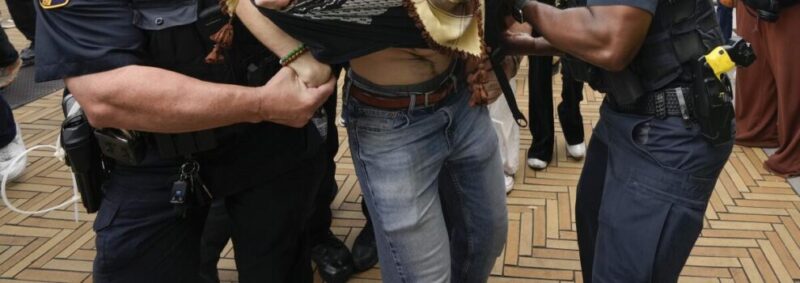Police Called In At UT Austin
In a surprising turn of events, protests erupted on various college campuses across the United States in support of Hamas and Palestine. While most states are known for their liberal views and tolerance towards different ideologies, it seemed that Texas and California were not going to tolerate any pro-Hamas shenanigans on their campuses.
The University of Texas at Austin saw more than 500 students walk out of class in support of Palestine and their demand for the university to divest from manufacturers who supply weapons to Israel. However, what started out as a peaceful demonstration turned chaotic when police officers arrived on the scene and tried to disperse the protesters using horses and riot gear.
Dozens of UT Austin students have been arrested after participating in a mob like pro terror rally on campus today.
“Antisemitism will not be tolerated in our state!” said TX Governor Abbot as he calls for the students arrested to be expelled. pic.twitter.com/JOi1LBp8ca
— StopAntisemitism (@StopAntisemites) April 25, 2024
Police officers warned the protesters multiple times to disperse and even singled out one of the protest organizers, stating that he would be the first to go. This resulted in the first arrest of the day, with many more to follow. Students who were facing arrest were seen writing down lawyer's phone numbers on their arms for legal assistance.
The chaos continued as officers formed a line and started pushing back the protesters, resulting in many falling to the ground. However, it was not just students who were arrested. Two members of the media were also taken into custody.
The situation was no different at the University of Southern California, where pro-Hamas camps were also set up. However, unlike the chaos in Texas, the camps were quickly dismantled by campus security forces. It seems that California, a state known for its liberal views, was also not going to allow any pro-terrorist activities on its campuses.
Now at UT Austin:
Protester walked up to Austin Police and starts yelling “fuck you,” to which one officer responded, “thank you for your support.” pic.twitter.com/kSVm8fbyyB
— Anna Giaritelli (@Anna_Giaritelli) April 24, 2024
These protests and crackdowns have sparked discussions and debates about the role of universities in political activism and the extent to which they should allow such protests. While some believe in the importance of free speech and expression on college campuses, others argue that promoting ideologies that support violence and terrorism should not be tolerated.
It is also worth noting that these protests have ignited strong emotions and divided opinions among the student body. Some believe that supporting Palestine and Hamas is equivalent to supporting terrorism, while others argue that it is important to show solidarity with oppressed people.
The aftermath of these protests has also raised discussions about the use of force by police officers and whether their actions were justified. However, authorities have maintained that they were simply enforcing the law and ensuring the safety and security of all individuals involved.
#BREAKING: Los Angeles police have arrived at the University of Southern California geared up in riot gear to make mass arrests with clashes happening⁰
#LosAngeles | #California⁰
Currently hundreds of students, pro-Palestine protesters, and other activists have gathered in… pic.twitter.com/bgXnKBOmGM— R A W S A L E R T S (@rawsalerts) April 25, 2024
As tensions continue to rise between Israel and Palestine, it is clear that the conflict has now reached college campuses in the United States. It remains to be seen how universities and law enforcement will handle future protests and whether stricter measures will be taken to prevent pro-Hamas or pro-Israeli demonstrations from turning violent.
For now, one thing is certain – these protests have once again brought the ongoing conflict between Israel and Palestine to the forefront and have sparked important discussions about free speech, political activism, and the role of universities in shaping the views and ideologies of their student body.

